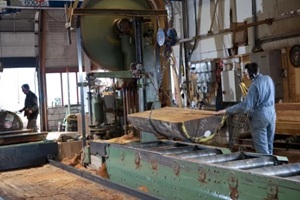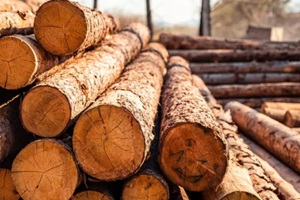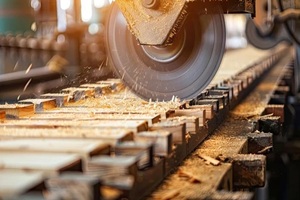
Operating a sawmill involves daily exposure to serious risks, and the smallest of errors can snowball into significant financial losses. Anything from heavy machinery on the floor to the materials being processed can endanger staff and property. That’s why having specialized sawmill insurance is so important.
Understanding the most common types of claims helps sawmill operators manage risk, minimize losses, and keep insurance premiums stable over time.
Frequent Sawmill Insurance Claims
Employee Injuries
Workers’ injuries remain one of the top reasons for sawmill insurance claims. Sawmills involve sharp blades, high-speed equipment, and constant handling of heavy logs. Due to these risks, the injury rate in sawmills far exceeds the national average of other industries, according to the Occupational Safety and Health Administration (OSHA).
Common incidents include:
- Deep cuts or limb loss from saw blades
- Crushing injuries from logs and machinery
- Respiratory problems from prolonged exposure to wood dust
- Hearing damage from loud operating environments
These injuries often lead to workers’ compensation claims, which can drive up insurance premiums if they occur frequently.
Equipment Breakdowns
Machinery breakdowns also result in costly insurance claims. Sawmills depend on specialized equipment, and when that equipment fails, production often comes to a halt. Some common causes of machinery claims include:
- Lack of preventive maintenance
- Electrical failures
- Overheating or mechanical faults
- Operator mistakes
While equipment breakdown insurance can help offset repair or replacement costs, preventing breakdowns in the first place keeps operations running smoothly and minimizes insurance claims.
Property Damage
Property damage is another common source of insurance claims. Fires are especially concerning due to the presence of combustible dust and wood waste, according to the National Fire Protection Association (NFPA).
Additional property risks include:
- Storm damage
- Vandalism
- Water damage
Commercial property insurance generally covers these kinds of damage, but regular maintenance can catch these problems before they start. It is important to note that typical policies do not cover damage from floods, which typically requires an additional rider or policy.
Business Interruption
Unexpected downtime following a fire, equipment failure, or other disaster can cause severe financial strain. You can bridge the financial gap with business interruption insurance while your operations are suspended. However, it should be used sparingly, as frequent claims can impact policy pricing. An insurance professional can offer guidance to help mitigate risk.
Environmental Claims
Sawmills may also encounter environmental claims in the event that chemicals, fuel, or waste contaminate the soil or nearby water sources. The Environmental Protection Agency (EPA) outlines how businesses may be held liable for environmental damage under federal law.
Claims in this category may involve:

- Chemical leaks
- Improper waste disposal
- Runoff contamination
Environmental liability insurance offers protection, but strict compliance with regulations helps avoid legal and financial exposure.
Third-Party Liability
General liability claims may follow if a visitor or contractor is injured on-site or if sawmill operations accidentally damage nearby property. Legal defense costs, settlements, or judgments can quickly become expensive.
Preventing Common Sawmill Claims
While insurance coverage is necessary, taking steps to lower the likelihood of claims protects employees and the business. Sawmill owners can reduce risks by addressing these areas:
Improve Worker Safety
Proper training is one of the best defenses against employee injuries. OSHA recommends that sawmill operators provide thorough instruction on machine safety, hazard awareness, and the proper use of personal protective equipment (PPE).
Training topics should include:
- Safe machinery operation
- Lockout/tagout procedures
- Material handling techniques
- Emergency response protocols
Refresher courses help workers retain this knowledge over time and learn new policies and procedures as updates are implemented.
Perform Routine Equipment Maintenance
Your machinery needs regular attention to keep it in working order. Without a regular maintenance schedule, your business runs the risk of machinery failures. Most manufacturers offer a recommended maintenance schedule you can follow to help prevent unexpected breakdowns. Maintenance logs should document the following:
- Inspections
- Lubrication
- Repairs
- Parts replacement
Proactive care extends equipment lifespan and reduces insurance claims tied to mechanical failures.
Minimize Fire Risks
The NFPA suggests having a collection system to trap sawdust, wood chips, and fuel, all of which can become fire hazards. Regular equipment cleaning can also help.
Additional safety measures include:
- Installing fire suppression systems
- Conducting routine fire drills
- Monitoring storage areas for flammable materials
Strengthen Property Security
Preventing vandalism and theft can protect valuable equipment and inventory. The National Institute of Standards and Technology (NIST) suggests businesses can secure their property through:
- Perimeter fencing
- Security cameras
- Controlled access points
- Proper lighting
These measures can lower property insurance premiums and reduce the risk of property loss.
Follow Environmental Regulations

Strict compliance with environmental regulations can prevent costly pollution claims. The EPA provides detailed business guidelines on managing waste, safely handling chemicals, and preventing runoff contamination.
Regular environmental audits and employee training help maintain compliance and minimize risks.
Review Insurance Coverage Frequently
Sawmill operations evolve. As equipment, staff, clients, or property changes, insurance needs may shift. Working closely with an insurance professional makes sure coverage remains appropriate and gaps are avoided.
Partner with Burton & Company to Protect Your Sawmill
Sawmill operations are subject to many risks, but proper safety measures and insurance coverage can make all the difference. Burton & Company helps sawmill owners throughout Virginia build insurance plans that protect their business while managing costs. Contact us online or call (888) 652-1325 to discuss how we can safeguard your sawmill business.

